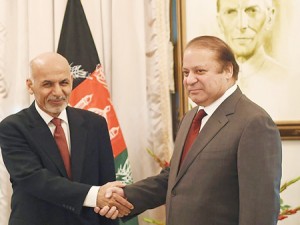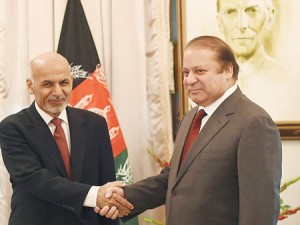Arab News
Muhammad Waqaas
 The recent Taliban bombing in the heart of Kabul that killed over 64 innocent civilians has sent a strong signal to the world. The back of Taliban is far from broken — they stand resilient and stronger than ever at any point since 2001 to stage large-scale attacks across Afghanistan.
The recent Taliban bombing in the heart of Kabul that killed over 64 innocent civilians has sent a strong signal to the world. The back of Taliban is far from broken — they stand resilient and stronger than ever at any point since 2001 to stage large-scale attacks across Afghanistan.
The deadly violence is not just having repercussions for Afghanistan’s internal security situation, but it is taking a toll on the already distraught relationship between Afghanistan and Pakistan as well.
Soon after the attack, Afghan Chief Executive Abdullah Abdullah canceled his much-anticipated trip to Pakistan, while Afghan President Ashraf Ghani has also made a policy shift of ending Pakistan’s role in the ongoing peace talks with Taliban. The change in policy coincides with rumors that a delegation from Qatar-based Taliban political office is visiting Pakistan to discuss peace prospects with the Afghan government after the group had recently dismissed negotiations under the quadrilateral group of Pakistan, Afghanistan, China and the United States. This development is not likely to drastically change the situation as the Afghan government faces a backlash for pursuing peace dialogue with the Taliban, who have launched their annual spring offensive encouraged by military gains in the country.
The Afghan government is seeking to pressurize Pakistan even though no concrete evidence has so far surfaced to implicate the country’s premier spy agency or any Pakistan-based militant organization in the Kabul bombing. From Pakistan’s perspective, the sharp US criticism of not doing enough against Haqqani network is disappointing. Over the past few months, the US administration had lauded Pakistan for bringing the Taliban back to negotiating table and pushing for peace in Afghanistan. Pakistan itself feels a victim of terrorism and interference by regional countries. The arrest of an Indian and Afghan intelligence operative along the border has only fueled its suspicions that neighboring countries are involved in stirring unrest in Pakistan.
It is high time that the Afghan and US officials recognized the regional peace initiatives and sacrifices of Pakistan in the war against terrorism. Rather than playing the blame game, the focus of all stakeholders should be on reaching a political solution to the Afghan crisis and building the capacity of security institutions in the war-torn country. The Taliban are ready to wait and fight till the end, while cracks begin to appear in the coalition. Restoring peace in Afghanistan would require patience, trust and openness from all parties. It must be understood that Pakistan stands to be the biggest loser in the region due to violence in Afghanistan; long-term stability in Pakistan is not possible without peace in its neighborhood. Any efforts to engage the Taliban by isolating Pakistan from the whole process are most likely to fail because the country still somehow maintains credibility and clout over the group.
Nonetheless, peace in Afghanistan is not the sole responsibility of Pakistan and all stakeholders must work together to create a conducive environment to end violence in the country.




